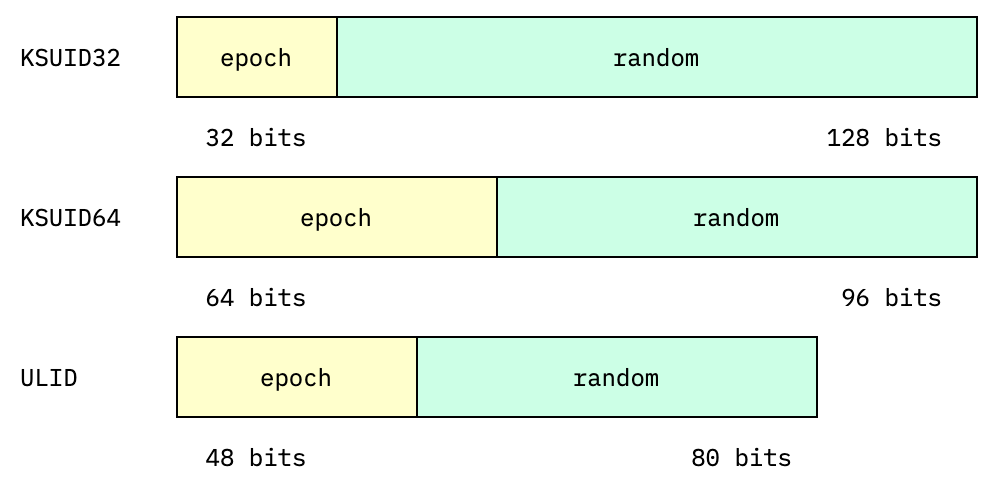
Security News
vlt Debuts New JavaScript Package Manager and Serverless Registry at NodeConf EU
vlt introduced its new package manager and a serverless registry this week, innovating in a space where npm has stagnated.
@thi.ng/ksuid
Advanced tools
Configurable K-sortable unique IDs, ULIDs, binary & base-N encoded, 32/48/64bit time resolutions

[!NOTE] This is one of 190 standalone projects, maintained as part of the @thi.ng/umbrella monorepo and anti-framework.
🚀 Please help me to work full-time on these projects by sponsoring me on GitHub. Thank you! ❤️
Configurable K-sortable unique IDs, ULIDs, binary & base-N encoded, 32/48/64bit time resolutions.
Idea based on segmentio/ksuid, though the added flexibility in terms of configuration & implementation also enables the creation of ULIDs:
| Feature | KSUID default | ULID default |
|---|---|---|
| Configurable bit size | 160 bits | 128 bits |
| Base-N encoding scheme | base62(1) | base32 (Crockford) |
| Timestamp resolution | seconds (32 bits) | milliseconds (48 bits) |
| milliseconds (64 bits) | ||
| Epoch start time offset | approx. 2020-09-13(2) | none |
| Time-only base ID generation | ✅ | ✅ |
| ID parsing / decomposition | ✅ | ✅ |
| Configurable RNG source(3) | ✅ | ✅ |
KSUID32 is 2156-10-20T18:54:55Zwindow.crypto, Math.random as fallbackIDs generated w/ this package are composed of a 32, 48 or 64 bit Unix epochs and
N additional bits of a random payload (from a configurable source). By default
all timestamps are shifted to free up bits for the future. IDs can be generated
as byte arrays or base-N encoded strings. For the latter, the JS runtime MUST
support
BigInt.

Since v3.1.0 a small CLI for ad-hoc KSUID generation is included. Currently only KSUID32 is supported and IDs are always based on the current time:
npx @thi.ng/ksuid
# 0dwncLZE8byaQdccncWDmsNmlYt
# optionally provide number of random bytes to be used (default: 16)
npx @thi.ng/ksuid 8
# 01ogp9KDpWlQ0pXCY
STABLE - used in production
Search or submit any issues for this package
Since v3.0.0 all
epoch
time-shift config values are to be given in milliseconds. This change is
unifying this behavior and is only a breaking change if using KSUID32 and
specifying custom epoch offsets (using defaults is not impacted).
Previously, KSUID32 used an offset given in seconds, whereas the other
implementations already used milliseconds.
yarn add @thi.ng/ksuid
ES module import:
<script type="module" src="https://cdn.skypack.dev/@thi.ng/ksuid"></script>
For Node.js REPL:
const ksuid = await import("@thi.ng/ksuid");
Package sizes (brotli'd, pre-treeshake): ESM: 997 bytes
import { defKSUID32, defKSUID64, defULID } from "@thi.ng/ksuid";
// init 32bit epoch (resolution: seconds) w/ defaults
const id = defKSUID32();
// init 64bit epoch (resolution: milliseconds), same API
const id = defKSUID64();
// init 48bit epoch (resolution: milliseconds), same API
const id = defULID();
id.next();
// '05XCWbXa3akRqLDBUw4ogCVKGkd'
const a = id.nextBinary()
// Uint8Array(20) [
// 0, 160, 48, 77, 101, 251,
// 244, 17, 155, 97, 24, 101,
// 70, 71, 207, 23, 32, 21,
// 244, 116
// ]
// format a binary KSUID
id.format(a);
// '05XCZ32AaDZfZt0SWE2C22o6cqK'
id.parse("05XCZ32AaDZfZt0SWE2C22o6cqK")
// {
// epoch: 1610498125000,
// id: Uint8Array(16) [
// 101, 251, 244, 17, 155, 97,
// 24, 101, 70, 71, 207, 23,
// 32, 21, 244, 116
// ]
// }
new Date(1610498125000).toISOString()
// '2021-01-13T00:35:25.000Z'
Creating custom IDs:
import { BASE36 } from "@thi.ng/base-n";
// using base36, no time shift, 64bit random part
const id36 = defKSUID32({ base: BASE36, epoch: 0, bytes: 8 });
id36.next();
// '2VOUKH4K59AG0RXR4XH'
Benchmarks can be run via yarn bench. All timings in milliseconds (test
config: Node v20.4.0, MBA M1 2021, 16GB). The benchmark collects N KSUIDs w/
different configs in an array, with each case being run 100 times.
| Title | Iter | Size | Total | Mean | Median | Min | Max | Q1 | Q3 | SD% |
|---|---|---|---|---|---|---|---|---|---|---|
| b62, 128bit, n=10000 | 100 | 1 | 2158.68 | 21.59 | 21.57 | 19.91 | 25.91 | 20.42 | 21.87 | 6.26 |
| b62, 64bit, n=10000 | 100 | 1 | 1200.40 | 12.00 | 11.95 | 11.27 | 14.66 | 11.82 | 12.10 | 3.99 |
If this project contributes to an academic publication, please cite it as:
@misc{thing-ksuid,
title = "@thi.ng/ksuid",
author = "Karsten Schmidt",
note = "https://thi.ng/ksuid",
year = 2020
}
© 2020 - 2024 Karsten Schmidt // Apache License 2.0
FAQs
Configurable K-sortable unique IDs, ULIDs, binary & base-N encoded, 32/48/64bit time resolutions
The npm package @thi.ng/ksuid receives a total of 192 weekly downloads. As such, @thi.ng/ksuid popularity was classified as not popular.
We found that @thi.ng/ksuid demonstrated a healthy version release cadence and project activity because the last version was released less than a year ago. It has 0 open source maintainers collaborating on the project.
Did you know?

Socket for GitHub automatically highlights issues in each pull request and monitors the health of all your open source dependencies. Discover the contents of your packages and block harmful activity before you install or update your dependencies.

Security News
vlt introduced its new package manager and a serverless registry this week, innovating in a space where npm has stagnated.

Security News
Research
The Socket Research Team uncovered a malicious Python package typosquatting the popular 'fabric' SSH library, silently exfiltrating AWS credentials from unsuspecting developers.

Security News
At its inaugural meeting, the JSR Working Group outlined plans for an open governance model and a roadmap to enhance JavaScript package management.